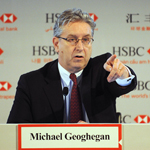
Chinese central bank official Yi Gang (pictured left) said the strength of lending in the country isn't a cause for concern and will stabilize, reflecting the government's reluctance to rein in economic stimulus measures. "I think overall, the situation will converge to a sustainable level," Deputy Central Bank Governor Yi told Bloomberg News on Oct. 3 in Istanbul, where the World Bank and International Monetary Fund are having their annual meetings. "In August, it was already not too much. June and August were pretty flat." Chinese officials including Yi and Finance Minister Xie Xuren met in Istanbul with other Group of 20 officials amid pledges to help shore up the world economy's recovery from the deepest recession since World War II. French Finance Minister Christine Lagarde expressed optimism after weekend meetings that China will play its part in rebalancing global growth. "This is the first time I've heard the Chinese" expressly indicate their growth forecasts and plans for domestic demand, she said yesterday. It was "very precise language" that, if followed, will help "address global imbalances" and "have consequences on exchange rates." – Bloomberg
Dominant Social Theme: China gets it right.
Free-Market Analysis: This article by Bloomberg is a great example of why modern financial journalism (mainstream style) sounds so good and all-too-often could use more substance. Below, we will quote some more from the article, but even before we do, we want to point out that the Bloomberg article has all the qualities that make central banking and monetary policy so seductive.
Even in the above excerpt, you can see French Finance Minister Christine Lagarde "expressing optimism" over statements of Chinese officials. She speaks of "precise language" as if words constitute a marketplace. The Group of 20 met "amid pledges to help shore up the world economy's recovery" as if pledges are a substitute for entrepreneurialism. They are not. Here is some more from the article:
As global trade flows declined, China suffered a 10-month slide in exports, damping growth in the region and pulling the nationwide expansion rate down to 6.1 percent in the first quarter, the slowest pace in almost a decade.
The government is using its 4 trillion yuan ($586 billion) stimulus and record bank lending to build railways, roads and power plants, mostly in the less-developed west and center of the country.
"The Chinese are masterful at entry and exit," said Goldman Sachs Group Inc. Chief Economist Jim O'Neill in an interview, adding he expects lending to slow in coming months. "They could give lessons to many others." …
China's new lending unexpectedly increased in August, reversing a dip in July, and money supply rose by a record, fueling the nation's recovery from the slowest expansion in almost a decade. Yi's comments echo others by China's top leaders aiming to keep growth intact even as it fuels the risk of asset-price inflation.
At the same time, China will study the use of "regulatory tools" to adjust bank lending, Su Ning, another deputy governor at the country's central bank, said Sept. 5. A credit boom and a 4 trillion-yuan ($586 billion) stimulus package spurred economic growth to a 7.9 percent annual rate in the second quarter.
Are we alone in considering an 8 percent annualized growth rate as fairly aggressive? Perhaps we could have seen this kind of growth rate a decade ago, but after 25 years, isn´t China´s industrial boom getting a little long in the tooth? And doesn't this kind of growth year after year strike one as a central banking phenomenon rather than a market-based one?
We have heard from visitors to China, in addition to our own first hand visits, over and over about the warehouses standing empty, of mile after mile of deserted businesses. Of shopping malls without customers. China wants to grow internally but the market mechanisms in China are worse than the ones in the West. Given what still amounts to a fair amount of command and control in China, the market signals that drive growth are just not there.
China does better supplying the Western world because Western leaders have not yet succeeded in destroying the market signals that tell entrepreneurs what to produce. China can produce things for the West that have both a value and a market. It is not yet clear if China will be able to sustain a legitimate market economy internally.
This may sound somewhat snide given that China is already among the world´s biggest economies. But the USSR was pretty big too at one time. We do believe that China is a lot farther along toward a real economy than it was even a decade ago. But we cannot help recalling an analysis of an outside reporter who interviewed two successful female Chinese stock speculators and concluded their success was due to divining what companies the government wanted to see succeed.

We are happy for Chinese central bankers that lending from the government to deserving businesses is headed for sustainable levels. Indeed, the lending may go on for years more. But Western central bankers said the same sorts of things before the recent financial crisis. No one knows what the future holds, least of all financial bureaucrats. The Chinese do not know how to get "get in and out" of inflationary policies anymore than anyone else. We continue to believe the Chinese are sitting on the world´s biggest un-popped financial bubble. When it bursts, whenever that is, the resonance may be both miserable and astonishing. At that point, with nothing left to lose, the world may return to a market-based silver and gold standard. In the meantime, it would be nice if Bloomberg articles were a bit more skeptical.
